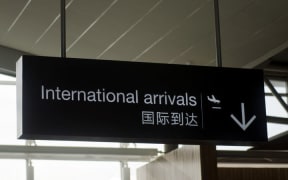The government is optimistic about growing the value of the foreign student industry from $4.5 billion to $6b-a-year by 2025 despite a 20 percent fall in new enrolments from China.

Education Minister Chris Hipkins speaking at an international education conference in Wellington. Photo: RNZ/John Gerritsen
Education Minister Chris Hipkins told an international education conference in Wellington today the goal was achievable, but would require a focus on quality and more enrolments from a greater variety of countries.
"The secret to success will be to ensure that the international student market for New Zealand is a diversified one. We can't rely on one or two countries, as we do now, to supply the vast bulk of our international students," Mr Hipkins told RNZ News.
The $6b figure included the estimated spending by students on living costs, as well as fees, and increased the previous government's target by $1b.
Mr Hipkins said it was difficult to know why new enrolments from China had fallen in the 12 months to the end of June.
He said changes to post-study work rights for foreign students would not harm future enrolments.
The changes announced this week removed employer-assisted two-year work visas that some businesses were using to exploit former students.
Instead, students who completed a course at degree level and above would be eligible for a three-year open work visa, while those studying at lower levels would get a one-year visa, or two years if they studied outside Auckland.
Mr Hipkins said the government was also investigating the exploitation of migrants and foreign students in a bid to crackdown on abuse.
Recent cases had damaged New Zealand's reputation with foreign students, he said.
"Any example of an international student being exploited from any country damages New Zealand's reputation around the world," he said.
"International agents, prospective international students do look closely at these kinds of things when they make their study decisions."
Indian education agents at the conference told RNZ News the work visa changes would help Indian student numbers recover following a slump in recent years.
"Of course, it will take a little time to spread the word and get the details to the market but I think overall it is a positive thing," Indian education agent Vinay Sood said.
Another agent, Vandana Rai, said the changes showed New Zealand wanted to look after its foreign students and concentrate on high quality education.
"The numbers may not reach what it was in 2014 because the policy was very lenient in that time, but definitely after an initial drop the numbers would pick up," she said.
However, Waikato Institute of Technology international market manager Edward Park said he would be looking elsewhere for more students.
"China will be slowly down, maybe a couple of years, and India will catch up. That's why we are concentrating on the South American countries and also the Japanese and the Korean and Philippines market," he said.
In the school sector, John van der Zwan from the Schools International Education Business Association, said a new opportunity was opening up for short-stay enrolments in primary schools.
The programme organised by the association brought children from China and other Asian countries for stays of four to six weeks with their parents, he said.
"Since January this year and for 2018 we've placed just over 200 students in primary schools across the country," he said.
"The growth potential is significant and the major limiter at the moment is the number of primary schools available to receive the students."
Mr van der Zwan said the students placed for 2018 represented about $500,000 in tuition fee revenue for schools and their overall contribution to the economy would be about $2 million this year.





